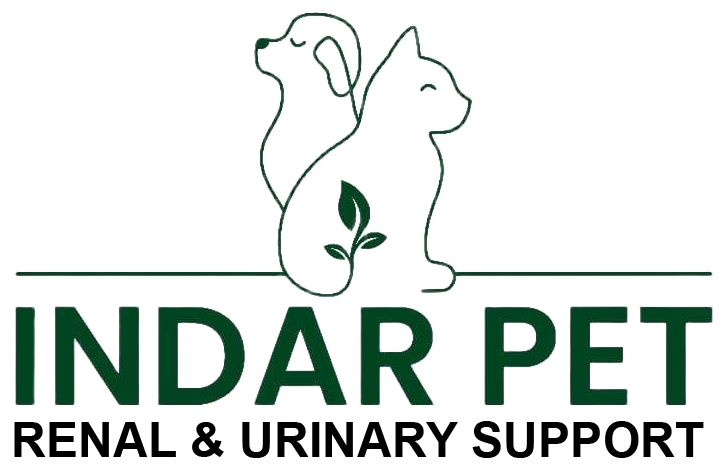Indar Pet
Understanding Blood and Urine Tests in Pets: What Every Pet parent Should Know
When your dog or cat has a kidney or urinary issue, one of the most important tools your vet will use to monitor their health is blood and urine testing. These tests provide vital insight into how well your pet’s organs are functioning — particularly the kidneys and liver, which play a key role in filtering waste and maintaining balance in the body.
While these results can seem confusing at first glance, understanding what they mean can help you work more closely with your vet — and take proactive steps to support your pet’s health at home.
What Blood Tests Reveal
A standard veterinary biochemistry and haematology panel will typically include the following key markers:
1. Urea (BUN) and Creatinine
These are the most important indicators of kidney function.
-
High levels suggest that the kidneys are not filtering waste effectively.
-
Mild increases can appear in early stages of kidney disease or dehydration.
-
Normal UK reference ranges (can vary slightly by lab):
-
Urea: 3.0 – 9.0 mmol/L (dogs), 6.0 – 12.0 mmol/L (cats)
-
Creatinine: 44 – 133 µmol/L (dogs), 71 – 212 µmol/L (cats)
-
2. SDMA (Symmetric Dimethylarginine)
A newer and more sensitive kidney marker, often rising before creatinine does.
-
Elevations may indicate early kidney stress — even before other symptoms appear.
3. Phosphorus and Calcium
-
High phosphorus is common in kidney disease and can worsen the condition.
-
The vet will aim to keep phosphorus below 1.6 mmol/L in chronic kidney patients.
-
Calcium levels are monitored too, as imbalances can signal further complications.
4. Electrolytes (Sodium, Potassium, Chloride)
These reflect your pet’s hydration and kidney balancing ability.
Abnormalities may mean the kidneys aren’t regulating minerals efficiently.
5. ALT, ALP (Liver Enzymes)
Because the liver and kidneys work together to detoxify the body, these are also checked.
High values can indicate liver strain, sometimes secondary to kidney stress.
💧 What Urine Tests Show
A urinalysis gives a direct look at how the kidneys are concentrating urine and removing waste.
1. Urine Specific Gravity (USG)
-
This measures how concentrated the urine is.
-
Low USG (below 1.030 in dogs, below 1.035 in cats) suggests the kidneys are struggling to retain water — often seen in early kidney disease.
2. Protein and Glucose
-
Protein in urine (proteinuria) can indicate kidney damage.
-
Glucose may appear in diabetic pets or with tubular dysfunction.
3. pH Levels
-
pH helps detect urinary tract issues and crystal formation.
-
Struvite crystals often form in alkaline urine (pH > 7.0), while calcium oxalate crystals appear in acidic urine (pH < 6.0).
4. Sediment and Crystals
The vet examines the urine under a microscope for bacteria, cells, or crystals — essential in diagnosing urinary tract infections (UTIs) or bladder stones.
🩺 What Your Vet Looks For
Your vet will interpret these results together — not in isolation.
They’ll assess:
-
The trend (whether values are rising or stable)
-
The clinical signs (thirst, urination, appetite, weight loss)
-
The stage of kidney disease (if present) using the IRIS guidelines commonly followed in the UK
Regular blood and urine testing — every 6 to 12 months for older pets — allows early detection and better long-term outcomes.
🌿 How Nutrition and Supplements Can Help
Once you and your vet understand the test results, diet becomes your most powerful tool.
At Indarpet.co.uk, we offer carefully selected renal and urinary support foods and supplements designed to help improve these test values naturally:
-
🥔 Low-protein, low-phosphorus recipes, help reduce kidney workload.
-
🌼 Herbal support blends with dandelion, nettle, and birch leaf aid detoxification and fluid balance.
-
🐟 Omega-3 fatty acids from fish oil may reduce kidney inflammation and protect tissue.
-
💧 Moisture-rich meals promote hydration, supporting urinary function and flushing toxins gently.
While these products can’t replace medical treatment, they can complement your vet’s plan — helping your pet maintain stable values and better wellbeing day to day.
👩⚕️ Work With Your Vet
Never adjust your pet’s diet or supplements without veterinary guidance.
Your vet is your partner in monitoring blood and urine results, interpreting changes, and ensuring your pet gets the right support at every stage.
💚 Take the Next Step
Support your pet’s kidneys and urinary system with expert-formulated nutrition and natural supplements.
👉 Visit our store today to explore our range of renal and urinary health products, made with the highest quality ingredients and trusted by pet owners across the UK. We also include stress-free urine collection tools for dogs and cats.
Have you tried specialised nutrition or urine collection products for your pet? How did it make a difference in their health and stress levels?
Give your furry friend the care — and the love — they deserve. 🐾

